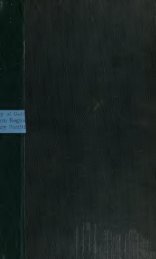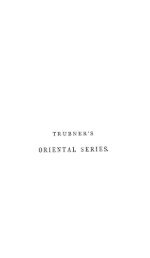Untitled
Untitled
Untitled
Create successful ePaper yourself
Turn your PDF publications into a flip-book with our unique Google optimized e-Paper software.
,. be<br />
I 3 8<br />
,<br />
ever, render its acceptance vpry difficult. Mirza Muhammad has communic^.ted<br />
to- me the ingenious suggestion that its historical basis is to<br />
found in a passage in Yaqrit's Mu'jamu'l Ud&bd or " Dictionary of<br />
Learned Men 1<br />
," where it is stated on the authority of Abu'l-Hasan ibn<br />
Abi'l-Qasim Zayd'al-Bayhaqi, author of the Mashdribu't-Tajdrib, that in<br />
the year 434/^042-3 the poet 'AH ibnu'l-Ha'san al-Bakhafzi and Abii<br />
Nasr Muhammad ibn Maiysiir al-Kund'uri, who subsequently became<br />
famous under the title of 'Amidu'l-Mulk as Minister to the Saljiiq<br />
Sultans Tughril Beg and Alp Arslan, were fellow-pupils of the same<br />
Imam Muwaffaq of Nishapiir at whose lectures the "Three Friends"<br />
are to<br />
supposed<br />
have become acquainted. That the framework o'f a<br />
story should be preserved with the substitution of more interesting or<br />
more celebrated personalities as its heroes is a very common literary<br />
phenomenon. If this has happened in the present case, the poet al-<br />
Bakharzi has simply been replaced by jthe poet 'Umar-i-Khayyam, and<br />
Alp Arslan's earlier Minister 'Amidul-Mulk by his later t Minister<br />
Nizdmrfl-Mulk) the Imam Muwaffaq remaining in both versions.<br />
"<br />
n. Ta'n'kh-i-Guzida. *<br />
This well-known history, composed in 730/1329-1330, also contains<br />
a brief notice of 'Uniar and cites one of his quatrains. ("E. J. W. Gibb<br />
Memorial" Series, xiv, i, pp. 817-818.)<br />
12. Firdawsu't-Tawarikh.<br />
This work, the "Paradise of Histories," composed in A.H. 808<br />
(A.D. 1405-6) by Mawlana Khusraw of Abarqiih, contains an account<br />
of 'Umar-i-Khayyam of* which the Persian text is reproduced from<br />
Zhukovski's article on pp. 217-219 of the Persian notes, and of which<br />
the substance is given in my Lit. Hist., ii, 254.<br />
13. The Ta'rikh-i-Alfi.<br />
This late work, composed, as its title implies, in A.H. 1000 (A.D. 1 59 1-2) 2<br />
for the Emperor Akbar by Ahmad ibn Nasru'llah of Tatta in India,<br />
contains a very entertaining anecdote concerning 'Umar-i-Khayyam's<br />
belief in Metempsychosis, which is given in Englislj -on pp. 254^ of<br />
vol. ii of my Lit. Hist, of Persia, and of which the Kxt will be fou,nd on<br />
pp. 219220 of the Persian notes. <<br />
The above list is far from exhaustive, but contains all the older and<br />
more authentic as well as the more interesting of the modern ndtices of<br />
this famous man.<br />
These include<br />
'Umar-i-Khayyam's<br />
Scientific Works.<br />
(1) His treatise on Algebra, of which the Arabic text accompanied .<br />
by a French translation was published at Paris in 1851 by F. Woepcke.<br />
(2) On the difficulties of Euclid's Definitions, of which a manuscript<br />
is preserved at Leyden (No. 967). See also Brockelmann, i, 471.<br />
1 "E. J. W. Gibb Memorial " Series, vi, 5, p. 124.<br />
2 It extends, however, only to the year 997/1588-9.








![La religione di Zarathustra nella storia religiosa dell' Iran [microform]..](https://img.yumpu.com/15970820/1/151x260/la-religione-di-zarathustra-nella-storia-religiosa-dell-iran-microform.jpg?quality=85)


